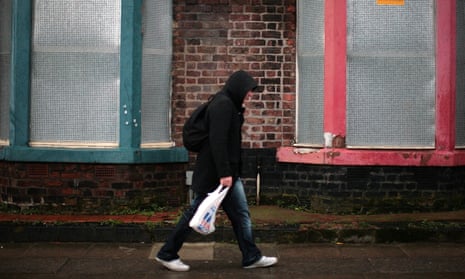More than 4 million people in the UK are trapped in deep poverty, meaning their income is at least 50% below the official breadline, locking them into a weekly struggle to afford the most basic living essentials, an independent study has shown.
The Social Metrics Commission also said 7 million people, including 2.3 million children, were affected by what it termed persistent poverty, meaning that they were not only in poverty but had been for at least two of the previous three years.
Highlighting evidence of rising levels of hardship in recent years among children, larger families, lone parent households and pensioners, the commission urged the new prime minister, Boris Johnson, to take urgent action to tackle growing poverty.
The commission’s chair, Philippa Stroud, a Conservative peer, said there was a pressing need for a concerted approach to the problem. “It is time to look again at our approach to children, and to invest in our children as the future of our nation,” she said.
Campaigners said the commission showed austerity had undermined two decades of anti-poverty policy. “By cutting £40bn a year from our work and pensions budget through cuts and freezes to tax credits and benefits, the government has put progress into reverse,” said Alison Garnham, the chief executive of Child Poverty Action Group.
The commission’s membership is drawn from experts across the political spectrum, and includes representatives from the Institute for Fiscal Studies, the Joseph Rowntree Foundation and the Office of the Children’s Commissioner. It was set up in 2016 to develop a new way of measuring poverty.
It found that of 14.3 million in the UK in poverty, 4.5 million were in deep poverty – a third of all those on the breadline, and 7% of the population. In cash terms this means a couple with two children would have an income of less than £211 a week after housing costs, and a single parent with one child would be on less than £101.50 a week.
The finding echoes wider concerns about the re-emergence of extreme poverty, known as destitution, which separate research has shown was experienced by an estimated 1.5 million people in the UK as a result of benefits cuts and high rents. A destitution level of income is £140 a week for a couple with two children.
Although overall rates of poverty have changed relatively little since 2000-01, certain groups – such as children, children of lone parents, and pensioners – have had hardship levels rise since 2013 as a result of austerity measures such as the benefit freeze, reversing earlier downward trends, the commission said.
There has been a dramatic rise in child poverty in families with three or more children, up 9% points since 2013-14. This is in part a result of policies that penalise larger families such as the benefit freeze. The figures do not capture the impact of the two-child benefit limit introduced in 2017, which is likely to push levels even higher.
The commission’s report confirms that disability is one of the strongest predictors of being in poverty. Nearly half of all those living below the breadline live in a household where someone is disabled.
It also confirms that work is no longer a guarantee of protection against poverty. At the millennium 54% of children in poverty lived in a family where an adult worked. That rose to 73% in 2o17-18. Even in families where all adults work full time, one in six children are in poverty.
Since the commission published its first report last year, the government has announced it will develop experimental national statistics based on its approach, indicating possible adoption as an official poverty measure. Its data was used by the UN rapporteur, Philip Alston, in his recent UK poverty report.
A government spokesperson said: “Tackling poverty will always be a priority for this government. We want to build on our progress to ensure every family can thrive. That’s why we’ve raised the personal allowance to take 1.74 million of the lowest paid out of income tax altogether and increased the national living wage to provide the biggest pay rise for low-paid workers in 20 years.”
Helen Barnard, a commission member and poverty expert at the Joseph Rowntree Foundation, said: “We need our new prime minister to get to work immediately on a bold plan to boost living standards and support our towns and cities in building a more hopeful economic future.”








